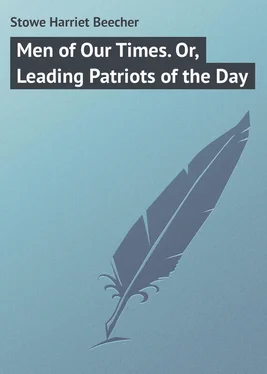Harriet Stowe - Men of Our Times. Or, Leading Patriots of the Day
Здесь есть возможность читать онлайн «Harriet Stowe - Men of Our Times. Or, Leading Patriots of the Day» — ознакомительный отрывок электронной книги совершенно бесплатно, а после прочтения отрывка купить полную версию. В некоторых случаях можно слушать аудио, скачать через торрент в формате fb2 и присутствует краткое содержание. ISBN: , Жанр: foreign_language, foreign_prose, на английском языке. Описание произведения, (предисловие) а так же отзывы посетителей доступны на портале библиотеки ЛибКат.
- Название:Men of Our Times. Or, Leading Patriots of the Day
- Автор:
- Жанр:
- Год:неизвестен
- ISBN:http://www.gutenberg.org/ebooks/46347
- Рейтинг книги:5 / 5. Голосов: 1
-
Избранное:Добавить в избранное
- Отзывы:
-
Ваша оценка:
- 100
- 1
- 2
- 3
- 4
- 5
Men of Our Times. Or, Leading Patriots of the Day: краткое содержание, описание и аннотация
Предлагаем к чтению аннотацию, описание, краткое содержание или предисловие (зависит от того, что написал сам автор книги «Men of Our Times. Or, Leading Patriots of the Day»). Если вы не нашли необходимую информацию о книге — напишите в комментариях, мы постараемся отыскать её.
Men of Our Times. Or, Leading Patriots of the Day — читать онлайн ознакомительный отрывок
Ниже представлен текст книги, разбитый по страницам. Система сохранения места последней прочитанной страницы, позволяет с удобством читать онлайн бесплатно книгу «Men of Our Times. Or, Leading Patriots of the Day», без необходимости каждый раз заново искать на чём Вы остановились. Поставьте закладку, и сможете в любой момент перейти на страницу, на которой закончили чтение.
Интервал:
Закладка:
One of his biographers says that he "seldom bought a new book, and seldom read one," and he adds, with a good deal of truth, that "his education was almost entirely a newspaper one," and that he "was one of the most thorough newspaper readers in America."
But that which was much more the real essence of his self-education, was the never-ceasing and strenuous course of laborious thought and reasoning that he kept up, upon the meaning, the connection, the tendency, the right and wrong, the helps or remedies, of all the past facts he read of, or of the present facts that he experienced in life. And this education he not only began early and pursued effectively, but he never ceased it. All his life he maintained that course of steady labor after practical knowledge and practical wisdom. Whenever he could read a good book he did, and his practice for a long time was, after having finished it, to write out an analysis of it; a very fatiguing but very improving process. One of his companions while a young "hired man," described him in after years, as "the likeliest boy in God's world. He would work all day as hard as any of us, and study by fire-light in the log house half the night, and in this way he made himself a thorough practical surveyor." Another man described him as he saw him while working for a living, in 1830, or thereabouts, "lying on a trundle-bed, with one leg stretched out rocking the cradle containing the child of his hostess, while he himself was absorbed in the study of English grammar."
The world has many losses that mankind are not conscious of. The burning of the Alexandrian library was an irreparable loss, but a greater loss is in the silence of great and peculiar minds. Had there been any record of what Lincoln thought and said while he thus hewed his way through the pedantic mazes of book learning, we might have some of the newest, the strangest, the most original contributions to the philosophy of grammar and human language in general that ever have been given. They would have savored very much of Beethoven's answer when the critics asked him why he would use consecutive octaves in music. "Because they sounded well," said the scornful old autocrat; and Lincoln's quiet perseverance in a style of using the English language peculiarly his own had something of the same pertinacity. He seemed equally amused by the critical rules of rhetoric, and as benevolently and paternally indulgent to the mass of eager scholars who thought them important, as he was to the turbulent baby whom he rocked with one leg while he pursued his grammatical studies. But after his own quaint, silent fashion, he kept up his inquiries into the world of book learning with remarkable perseverance, and his friend and biographer, Mr. Arnold, says, became "thoroughly at home in all the liberal studies and scientific questions of the day." This is rather strongly put, and we fancy that Lincoln would have smiled shrewdly over it, but the specifications which Mr. Arnold adds are undoubtedly true. Mr. Lincoln "had mastered English, and made some progress in Latin, and knew the Bible more thoroughly than many who have spent their lives in its perusal."
But what book learning he obtained would never have made him a lawyer, not to say President. The education which gave him his success in life was his self-training in the ability to understand and to state facts and principles about men and things.
In 1836 our backwoodsman, flat-boat hand, captain, surveyor, obtained a license to practice law, and as might be expected, rose rapidly. One anecdote will show the esteem in which he was held in his neighborhood. A client came to him in a case relating to a certain land claim, and Lincoln said to him, "Your first step must be to take thirty thousand dollars and go and make a legal tender; it of course will be refused, but it is a necessary step." "But," said the man, "I haven't the thirty thousand dollars to make it with." "O, that's it; just step over to the bank with me, and I'll get it." So into the bank they went, and Lincoln says to the cashier, "We just want to take thirty thousand dollars to make a legal tender with; I'll bring it back in an hour or two." The cashier handed across the money to "Honest Abe," and without a scratch of the pen in acknowledgment, he strode his way with the money, all in the most sacred simplicity, made the tender, and brought it back with as much nonchalance as if he had been borrowing a silver spoon of his grandmother.
It was after he had been practicing law some time, that another incident took place, showing him as curiously scrupulous about small sums as he was trusty and trusted about large ones. When he left New Salem and went to Springfield, he was still so poor that he even found it difficult to procure the necessaries of life. For some years he struggled forward, when one day there came a post-office agent, who in pursuance of the routine business of the department, presented to the almost penniless and still struggling ex-postmaster a regulation draft for the balance due to the Washington office, in all $17.60. Dr. Henry, a friend of Mr. Lincoln's, happening to fall in with the agent, went along with him, intending to offer to lend the money, as it was about certain that he could have no such sum as that at his command. When the draft was presented, Lincoln asked the officer to be seated, sat down himself a few moments, looking puzzled; then asked to be excused for a little, stepped out to his boarding house and returned. He brought with him an old stocking, untied it, and poured out on the table a quantity of small silver coin and "red cents." These they counted; they amounted to $17.60, the precise amount called for by the draft. More than that – it was the very money called for by the draft, for at leaving his postmastership, the punctilious officer had tied up the balance on hand, and kept it by him, awaiting the legal call for it. At paying it over, he remarked that he never used, even temporarily, any money that was not his . This money, he added, he felt belonged to the government, and he had no right to exchange or use it for any purposes of his own.
His honesty, shrewdness, energy and keen practical insight into men and things soon made him the most influential man in his state, both as lawyer and politician. Of this influence, and most especially of its depending upon his wonderfully direct plain common sense, and the absolute honesty and utter justness of his mind, there are many anecdotes. In politics and in law alike, both the strength of his conscientiousness and the kind of yearning after a rounded wholeness of view which was an intellectual instinct with him, forced him habitually to consider all sides of any question. "For fifteen years before his election to the Presidency," says one writer, in striking illustration of this habit in politics, "he subscribed regularly to The Richmond Enquirer and The Charleston Mercury . He grew slowly, as public opinion grew; and as an anti-slavery man, was a gradual convert." Thus it resulted that "while Rhett and Wise, with slavery in full feather, wrote every day the inviolateness of secession and the divinity of bondage, these two Illinois lawyers, (Lincoln and his partner, Herndon,) in their little square office, read every vaunting cruel word, paid to read it, and educated themselves out of their mutual indignations."
In like manner he was fair and impartial in legal investigations. "The jury" says one account, "always got from him a fair statement of any case in hand, and years later it was remarked by the Chief Justice of Illinois that when Lincoln spoke, he argued both sides of the case so well that a speech in response was always superfluous."
Mr. Lincoln's fellow lawyers used to say that he was in professional matters, "perversely honest." He could not take hold heartily on the wrong side. He never engaged in it, knowingly; if a man desired to retain him whose cause was bad, he declined, and told the applicant not to go to law. A lady once came to him to have him prosecute a claim to some land, and gave him the papers in the case for examination, together with a retainer in the shape of a check for two hundred dollars. Next day she came to see what her prospects were, when Mr. Lincoln told her that he had examined the documents very carefully, that she "had not a peg to hang her claim on," and that he could not conscientiously advise her to bring an action. Having heard this judgment, the lady thanked him, took her papers, and was about to depart. "Wait a moment," said Mr. Lincoln, "here is the check you gave me." "But," said she, "Mr. Lincoln, I think you have earned that ." "No, no," he answered, insisting on her receiving it, "that would not be right. I can't take pay for doing my duty."
Читать дальшеИнтервал:
Закладка:
Похожие книги на «Men of Our Times. Or, Leading Patriots of the Day»
Представляем Вашему вниманию похожие книги на «Men of Our Times. Or, Leading Patriots of the Day» списком для выбора. Мы отобрали схожую по названию и смыслу литературу в надежде предоставить читателям больше вариантов отыскать новые, интересные, ещё непрочитанные произведения.
Обсуждение, отзывы о книге «Men of Our Times. Or, Leading Patriots of the Day» и просто собственные мнения читателей. Оставьте ваши комментарии, напишите, что Вы думаете о произведении, его смысле или главных героях. Укажите что конкретно понравилось, а что нет, и почему Вы так считаете.












